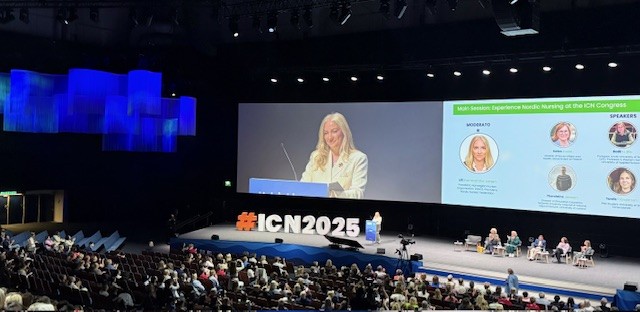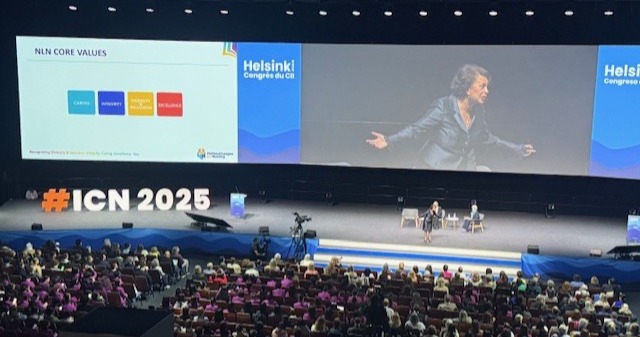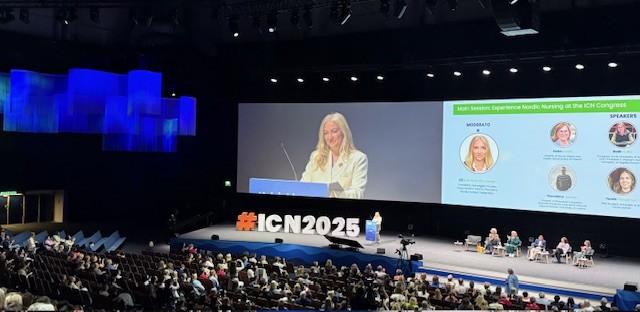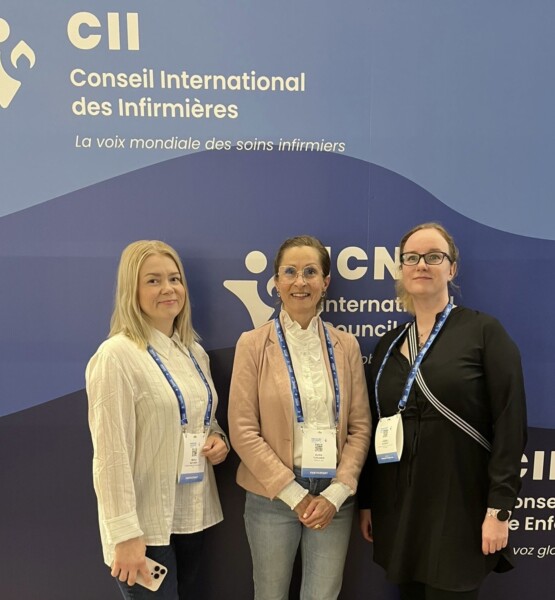
Savonia Article Pro: Nursing Power – to Change the World
Savonia Article Pro is a collection of multidisciplinary Savonia expertise on various topics.
This work is licensed under CC BY-SA 4.0
For the first time in a century, the International Council of Nurses (ICN) Congress was held in Finland, bringing together nursing professionals and experts from around the globe in early June. The congress was opened by ICN President Pamela F. Cipriano, and the opening ceremony featured nurses’ associations from several countries. Finnish Nurses Association was also represented by the president Heljä Lundgrén-Laine.
During the week-long congress, key themes included nursing practices, nursing education, and leadership. There were many inspiring speakers from around the world, including NLN President Beverly Malone, Professor Linda Aiken, and Paula Risikko. Risikko highlighted that core nursing functions support not only health, but also social and psychological resilience, as well as inclusion—key elements in maintaining societal functioning and wellbeing. Professor Linda Aiken, one of the main directors of the Magnet4Europe program, spoke in a session that explored nurse wellbeing, retention, and patient safety. Beverly Malone delivered a particularly inspiring message, emphasizing that nurses are not only caregivers but also key actors in transforming healthcare.

As emphasized in the headline, a central theme of the congress was the recognition of nurses’ capacity to influence the world around them and the essential societal role of the nursing profession. Session’s topics varied from complex global health issues like pandemics to nursing in conflict areas. One of the most prominently featured topics was also artificial intelligence (AI), which was explored in multiple sessions. Although many of these sessions provided relatively introductory-level insights into AI, the overarching consensus remained clear: when applied appropriately, AI represents a valuable and supportive tool in education (Salomon, 2025) and healthcare contexts. Numerous AI applications are already in use within healthcare, such as systems capable of predicting changes in blood glucose levels (Yorke, 2025). In nursing practice, AI can ease documentation burdens, support proactive care, and thereby reduce risks and adverse events. Looking ahead, AI can assist in clinical decision-making, and it is essential that nurses be involved in the development of AI applications within healthcare (Murphy, 2025). Accordingly, AI must be integrated both into nursing curricula and pedagogical practices. (El Arab et al., 2025; Murphy, 2025)

The discussion also emphasized how data-driven care supports clinical decision-making, enables more precise and personalized treatments, and positions nursing as a visible part of the STEM field – even though it is still not widely recognized as such Yorke 2025, Risling 2025)
Global standards in nursing education were the focus of one session. These standards aim to improve the quality of nursing education worldwide and harmonize educational frameworks. Greater consistency in education could enhance international mobility and cooperation. However, regional and cultural specificities must continue to be acknowledged and respected in future nursing education development. (Campbell, 2025)
Themes related to nurse educator competencies—based on the National League for Nursing (NLN) framework—were also presented. These competencies have been synthesized into a diagram using AI (Figure 1).

In the session “Experience Nordic Nursing”, organized by the Nordic Nurses Federation (NNF), participants were introduced to nursing practices across the Nordic countries. Minister of Social Affairs and Health Kaisa Juuso addressed wide perspective to national state of nursing in Finland. The representative from Denmark described how healthcare services are delivered entirely via remote contact in small island communities. In addition, an Advanced Practice Nurse (APN) project in the Faroe Islands was presented, aimed at ensuring high-quality and timely nursing care. APNs can work with extended responsibilities, focusing on the patient’s or client’s holistic health, which may improve access to services and enhance overall care. (Tróndarson, 2025)
The same session also featured the presentation of an interdisciplinary learning center, where professionals from various fields collaborate in their learning process. This was captured by the speaker Thorsteinn Jónsson: “How can they work together if they don’t learn together?

The session titled “Nurse Migration and Mobility” explored various perspectives on internationalization within the nursing profession. It was noted that internationally educated nurses (IENs) often face cultural differences in values and clinical practices across countries. A key theme that emerged was the importance of ethical recruitment, particularly considering increasing nurse migration. The session also introduced the WHO Global Code of Practice on the International Recruitment of Health Personnel – National Reporting Instrument (WHO, 2024), which emphasizes the need for transparent and fair recruitment processes. According to a comprehensive report by Brubakk et al. (2024), bilateral labour agreements (BLA) may serve as an effective mechanism to ensure the ethical recruitment of IENs.
The Exhibition Area gathered a variety of nursing-related organizations and initiatives. One of these, SimX, demonstrated a virtual reality-based system applicable also to nursing education. This platform enabled participants to practice simulated nursing scenarios ranging from operating rooms to home care environments. Exhibition Area was great chance for networking and meeting nursing professionals globally and regionally.

The ICN congress provided a comprehensive overview of the international context of nursing, including research, leadership, and education. Although participants were able to engage with only a fraction of the extensive knowledge shared during the events, the experiences proved to be profoundly empowering. They strengthened nurses’ sense of professional belonging and highlighted the value of being part of the global nursing community. At the same time, they reinforced participants’ deep pride in the nursing profession and inspired the development of practices, research, and education to be even more impactful on an international scale. The congress also offered the opportunity to hear from colleagues from different countries, learn about experiences related to best practices, and explore the latest innovations, which strengthened professional competence and broadened perspectives on the future of nursing.
Next ICN Congress will be organized in Nashville, Tennessee in September 2026.
Resources
Brubakk, K., Godfrey, M., Kwaku, F., Solberg, T., & Toure, Y. (2024). Can bilateral labour agreements safeguard the rights, health and well-being of internationally educated nurses in Europe? Full report & recommendations. GNLI Scholars Euro Region. Available: https://repository.rcsi.com/articles/report/Can_bilateral_labour_agreements_safeguard_the_rights_health_and_well-being_of_internationally_educated_nurses_in_Europe_Full_report_recommendations/26114605
Campbell, C. (2025). Do we need global standards in nursing education? ICN congress. 10.6.2025.
El Arab, R. A., Al Moosa, O. A., Abuadas, F. H., & Somerville, J. (2025). The role of AI in nursing education and practice: Umbrella review. Journal of Medical Internet Research, 27(4), e69881. https://doi.org/10.2196/69881
Murphy, J. (2025). The digitalization of EU health care systems: upskilling and reskilling the EU nursing workforce for sustainable and resilient healthcare systems. ICN congress. 10.6.2025.
National League for Nursing. (2020). Core competencies for academic nurse educators. Website. Available: https://www.nln.org/education/nursing-education-competencies/core-competencies-for-academic-nurse-educators
Salomon, R. (2025). Integrating AI into Nursing PhD Education: A Pedagogical Innovation for Enhancing Student Engagement with Theory Research. ICN congress. 10.6.2025.
Risling T. (2025) Revolutionizing health care with digital innovations – An opportunity to revolutionize nursing as a STEM discipline. ICN congress. 10.6.2025.
Tróndarson, T. (2025). The APN FO Project. ICN Congress. 10.6.2025.
Yorke, J. (2025). Revolutionizing health care with digital innovations – An opportunity to revolutionize nursing as a STEM discipline. ICN congress. 10.6.2025.
Writers
Merja Natunen, RN, MHSc, Teacher
Tanja Miettinen TtM, RN, MSc, Lecturer